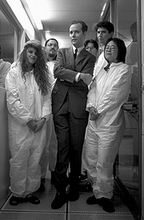I have a post up here at Relief Journal about some things that have really struck me this go round about L'Abri's philosophy and practice. The rest of this post is a more specific example of the kind of conversation that reflects this philosophy (as is the post on Buber/Sufjan that follows it).
***************************************************************************************
***************************************************************************************
This Tuesday’s lunch discussion is a beautiful
example of the vulnerability, humility, and trust it takes to ask an honest
question. A young Korean student—someone who has been very shy and quiet thus
far in the term—spoke up almost immediately after the worker asked if anyone
had a question.
She said: “How do we eliminate
prejudice from our hearts?”. After asking this, and giving several examples
from her experience, she said that seeking an answer to this question was the
main reason she has come to L’Abri (she will be here for the entire three month
term). We then ended up spending a good amount of time discussing what the
student meant by the use of the term “prejudice”--we often spend a lot of time
at table discussions defining terms—and I have learned that this is a way to
begin to truly hear another person rather than assume that I know what he/she
means. Our discussion ended up focusing more on the idea of judging another
person because of his/her behavior as opposed to holding prejudice towards a
different race, nationality, or class.
The worker at the head of the table
made an interesting distinction between the necessary act of judging actions
and the problematic/unhelpful/sinful embracing of “judgementalism” as a
worldview. There was a consensus that we must judge actions if we believe in
justice; as another worker said “We must have judgements. Without judgement,
there is no forgiveness.” In other words, if we never judge, then we do not
recognize either evil or goodness. But this is also tricky when encountering
another person and, if practiced non-relationally—as simply following a set of
rules, it can so easily lead to an attitude of self-righteousness. It can also
prevent us from truly seeing that other person. When we take the time to truly
hear someone else’s story and begin to understand the motives and reasons for
their actions, we often see that it is not such a simple binary (black/white) issue. The question I was left
with was this: Although I agree that we need to judge whether an action is
right or wrong (but even that is hard because sometimes we do not have enough
information and might judge incorrectly), I wonder if it is right to actually
judge a person as a good person or a bad person. I am inclined to say no; I
believe that only God can really know this. And that the “line of good and
evil” (as both Dostoevsky and NT Wright call it) runs right through the heart
of each human being. The practice of capital punishment implies that we can
judge a person’s worth fully and say when they have become so inhuman that they
deserve to no longer live. But where is the hope for redemption? The
acknowledgement that God’s image is in each individual?
























No comments:
Post a Comment